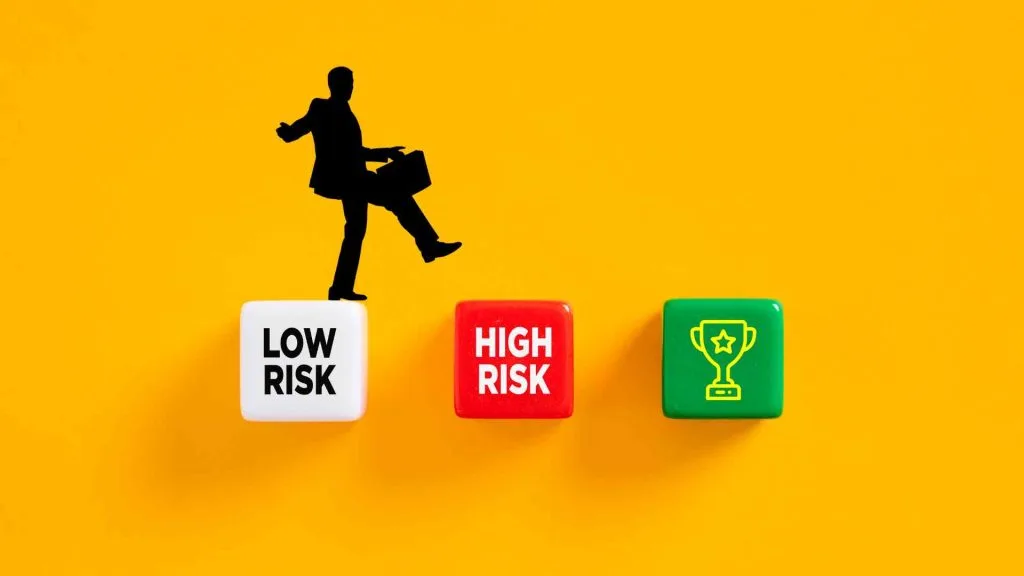Ever wondered what life has in store for you if you dare to take risks?
Embracing the unknown, stepping out of your comfort zone, and seizing opportunities can lead to remarkable growth and unexpected rewards.

Understanding Risk
Definition
Risk-taking is stepping into the unknown, embracing uncertainty for potential rewards and growth. It involves challenges and opportunities, fostering personal development through new experiences.
Making decisions with uncertain outcomes characterizes risk-taking, leading to personal growth.
Taking risks is crucial for personal development, as it opens doors to new opportunities and avenues for growth.
By stepping out of comfort zones, individuals can experience significant personal growth and self-discovery. Embracing risks is vital for achieving meaningful goals, pushing individuals towards a more fulfilling life.
Importance
Common misconceptions often equate risk-taking with recklessness, but there’s a clear distinction between calculated risks and reckless behavior.
Evaluating risks before taking action is essential to ensure that the potential benefits outweigh the downsides. Not all risks are worth taking; setting boundaries helps individuals navigate the fine line between boldness and recklessness.

Risk-Taking Benefits
Personal Growth
Taking risks is crucial for personal growth as it pushes individuals to step out of their comfort zones. By venturing into the unknown, people can experience new things and broaden their horizons. Discovering one’s true potential often results from taking risks and facing challenges head-on.
Engaging in risk-taking activities can help individuals shape their identities and beliefs by challenging existing perspectives.
The process of overcoming uncertainties and obstacles fosters resilience and self-discovery. Through risk-taking, people can unlock hidden talents and strengths they never knew they possessed.
Risk-taking serves as a catalyst for personal development by instilling a sense of confidence and empowerment.
It encourages individuals to embrace change and adapt to new situations with an open mind. The willingness to take risks propels individuals towards growth by encouraging them to confront fears and uncertainties.
Success Pathways
Embracing calculated risks is essential for navigating different pathways to success. By taking strategic chances, individuals can pave the way towards achieving their goals and aspirations.
Success often hinges on the ability to make informed decisions amidst uncertainty.
Perseverance plays a vital role in the journey towards success, requiring individuals to remain steadfast in the face of challenges.
Embracing risk-taking as part of the success equation involves learning from failures and setbacks along the way. Those who dare to take risks are more likely to reap rewards that come with venturing into uncharted territories.
Success stories are often intertwined with tales of individuals who have embraced risk-taking as a fundamental principle in their lives.
Visionaries who have achieved remarkable feats attribute their accomplishments to stepping out of their comfort zones and seizing opportunities presented by risks. By embracing uncertainty, these individuals have carved unique paths towards success.
Opportunity Creation
Risk-taking acts as a gateway to creating new opportunities that may not have been possible otherwise. Seizing these opportunities often requires individuals to take bold steps into unfamiliar territories where growth lies beyond comfort zones.
By being receptive to risks, people open themselves up to a world of possibilities waiting on the other side.
Being proactive in seeking out opportunities through risk-taking allows individuals to explore uncharted territories that hold untapped potential.
The willingness to take calculated risks enables individuals to break free from limiting beliefs and embrace growth-oriented mindsets. Those who dare to venture into the unknown are more likely to stumble upon unexpected outcomes that lead to personal and professional advancement.
The act of taking risks is not merely about chance but about actively creating opportunities that propel individuals towards growth and success. By daring to challenge conventions, people set themselves on a trajectory towards innovation, discovery, and fulfillment.

Comfort Zone Limitations
Recognizing Barriers
Taking risks in life can be daunting due to various barriers that individuals face. Fear, uncertainty, and self-doubt are common obstacles that hinder people from stepping out of their comfort zones. These emotions often create mental blocks, preventing individuals from embracing new challenges.
Overcoming these barriers is crucial for personal growth and success. It is essential to acknowledge and address the mental and emotional obstacles that hold us back from taking risks.
By recognizing these barriers, individuals can develop strategies to break through them and pursue opportunities that lie beyond their comfort zones.
To identify and overcome these barriers, individuals can start by acknowledging their fears and doubts. Self-reflection plays a key role in understanding what holds us back from taking risks.
Seeking support from mentors or peers can provide valuable insights and guidance in navigating through these obstacles.
Another effective strategy is to gradually expose oneself to small risks, building confidence along the way.
By starting with manageable challenges, individuals can gradually expand their comfort zones and become more comfortable with uncertainty. Embracing a growth mindset and viewing failures as learning opportunities are also essential in overcoming barriers to risk-taking.
Impact on Growth
Stepping outside one’s comfort zone and taking risks can have a profound impact on both personal and professional growth.
By venturing into uncharted territories, individuals open themselves up to new opportunities, experiences, and perspectives. Risk-taking serves as a catalyst for growth by pushing individuals to explore their full potential.
The challenges encountered through risk-taking serve as valuable learning experiences, fostering resilience and adaptability.
Overcoming obstacles through calculated risks not only builds confidence but also expands one’s skill set and knowledge base. Individuals who embrace risk-taking often find themselves better equipped to handle uncertainty and navigate complex situations.
Moreover, risk-taking plays a vital role in propelling individuals beyond their perceived limitations. By challenging themselves to take bold steps, individuals discover hidden talents, strengths, and capabilities they never knew existed. The willingness to embrace uncertainty and discomfort paves the way for transformative growth opportunities.
Individuals who have embraced risk-taking have witnessed significant personal development and achievements.
From entrepreneurs launching innovative startups to professionals pursuing unconventional career paths, those who dare to take risks often reap substantial rewards. These success stories serve as inspiration for others looking to break free from their comfort zones.

Overcoming Fear
Identifying Fears
Fear is a powerful emotion that can hinder personal growth and prevent individuals from seizing opportunities. Identifying fears is the first step towards overcoming them.
Common fears such as fear of failure, rejection, or the unknown often hold people back from taking risks. Acknowledging these fears is crucial before embarking on new ventures. Self-awareness plays a significant role in understanding the root causes of these fears.
To move forward with confidence, it’s essential to address and confront these fears head-on.
Tips for overcoming fears include breaking tasks into smaller steps, seeking support from others, and visualizing success. By acknowledging and accepting one’s fears, individuals can gradually build the courage to step out of their comfort zones and embrace new challenges.

Embracing Uncertainty
Changing Perspectives
Shifting perspectives is crucial when taking risks in life. By viewing challenges as opportunities, individuals can unlock new paths for growth and success. This change in mindset allows for embracing uncertainty with confidence and courage.
Reframing obstacles as stepping stones to progress empowers individuals to step out of their comfort zones. It enables them to see setbacks not as failures but as valuable learning experiences that propel them forward. This shift in perspective fosters a mindset of resilience and adaptability.
For instance, someone afraid of public speaking can reframe it as an opportunity to improve communication skills. By seeing it as a chance to grow rather than a daunting task, they approach it with a positive outlook, leading to better outcomes. Changing perspectives transforms challenges into stepping stones towards personal development.
Learning from Failure
Learning from failure is an integral part of the risk-taking journey. Each setback provides valuable insights and lessons that contribute to personal growth and development. Embracing failures with an open mind allows individuals to extract wisdom from each experience.
Failures teach us resilience and perseverance, essential traits for navigating life’s uncertainties. They build character and strengthen our resolve to pursue our goals despite obstacles. Understanding that failure is not the end but a stepping stone towards success is key in the risk-taking process.
To learn from failure effectively, one must reflect on what went wrong, identify lessons learned, and apply them in future endeavors. By analyzing mistakes without self-judgment, individuals can gain valuable insights that shape their future decisions positively.

Growth Through Risks
Building Resilience
Resilience plays a crucial role in navigating risks and challenges by enabling individuals to adapt and thrive in the face of adversity. When facing setbacks, resilient individuals demonstrate the ability to bounce back and continue moving forward. This quality is essential for maintaining motivation and focus during challenging times.
Developing resilience involves cultivating a positive mindset that allows individuals to see obstacles as opportunities for growth. By reframing setbacks as learning experiences, individuals can build their resilience muscle and emerge stronger from challenges. Engaging in regular self-care practices such as exercise, meditation, and seeking support from others can also enhance resilience.
To build resilience in the face of uncertainty and risks, it is important to practice mindfulness and stay present in the moment. Setting realistic goals, maintaining a sense of purpose, and fostering strong social connections are key elements of resilience-building. Engaging in activities that promote self-reflection and personal growth can contribute to developing resilience over time.
Benefits of Building Resilience:
- Improved mental well-being
- Enhanced problem-solving skills
- Greater emotional stability
Enhancing Creativity
Risk-taking serves as a catalyst for enhancing creativity and innovation by pushing individuals beyond their comfort zones.
Stepping into unfamiliar territory sparks new ideas and perspectives that may not have emerged otherwise. The willingness to take risks opens up possibilities for creative breakthroughs and unconventional solutions.
When individuals embrace risk-taking, they are more likely to engage in out-of-the-box thinking that leads to innovative outcomes.
Creative endeavors often require a departure from conventional approaches, prompting individuals to explore new pathways and experiment with different methods. By embracing uncertainty and ambiguity, individuals can tap into their creative potential more fully.
The connection between risk-taking and creative thinking lies in the willingness to challenge norms and push boundaries.
By venturing into uncharted territory, individuals expose themselves to diverse experiences that stimulate their imagination. Embracing failure as part of the creative process encourages experimentation and iteration, ultimately leading to novel ideas.

Real-Life Examples
Success Stories
Successful risk-taking is exemplified by individuals like Oprah Winfrey, who overcame adversity to become a media mogul. Her journey from a troubled upbringing to establishing her own media empire showcases the power of perseverance and bold decision-making.
Another example is Elon Musk, known for his ventures in Tesla and SpaceX. His determination to revolutionize industries through innovative ideas highlights the transformative potential of taking risks. These success stories demonstrate that calculated risks can lead to remarkable achievements.
In the tech world, Mark Zuckerberg’s creation of Facebook illustrates how risk-taking can redefine social networking. His vision and willingness to venture into uncharted territory paved the way for one of the most influential platforms globally.
Failure Lessons
Failures are often stepping stones to success, as seen in the story of J.K. Rowling, whose initial rejections for “Harry Potter” led to eventual worldwide acclaim. Her persistence despite setbacks underscores the importance of resilience in the face of failure.
Similarly, Steve Jobs’ ousting from Apple before returning to lead it to unprecedented success showcases how setbacks can fuel personal growth. His ability to learn from failures and adapt reflects a crucial aspect of successful risk-taking.
Embracing failure as a learning opportunity is vital, as demonstrated by Sara Blakely’s journey with Spanx. Her willingness to learn from missteps and iterate on her ideas transformed her into a self-made billionaire.

Connecting Through Risks
Building Relationships
Building relationships plays a crucial role in supporting risk-taking.
When individuals have a strong support system, they feel more encouraged to step out of their comfort zones and pursue new opportunities. Surrounding oneself with encouraging and guiding individuals can provide the necessary push to take calculated risks.
Having a network of supportive friends, family, or mentors is essential for anyone looking to embark on a risky endeavor.
These connections offer valuable advice, feedback, and encouragement that can help navigate challenges and uncertainties along the way. By fostering relationships with people who believe in your potential, you create an environment conducive to embracing risk.
Networking and collaboration are key components of successful risk-taking. By engaging with a diverse group of individuals, you open yourself up to new perspectives, ideas, and opportunities.
Collaborating with others allows you to leverage different strengths and expertise, increasing the chances of success in your risky endeavors. Supportive networks can provide valuable insights and resources that may not be accessible otherwise.
- Surround yourself with individuals who share your passion for taking risks.
- Seek out mentors or peers who have experience in the areas where you want to take risks.
- Regularly engage with your network by attending events, workshops, or networking sessions.
- Be open to feedback and constructive criticism from those within your circle.
- Offer support and guidance to others in your network to build mutually beneficial relationships.
Networking Opportunities
Taking risks often leads to unexpected networking opportunities that can significantly impact one’s personal and professional growth.
When individuals step outside their comfort zones and explore new ventures, they naturally come into contact with a diverse range of people who can offer unique perspectives and insights. These connections can pave the way for exciting collaborations and partnerships.
Networking through risk-taking opens doors to new collaborations that may not have been possible otherwise.
By sharing your experiences and ideas with others, you create opportunities for joint projects or ventures that capitalize on each other’s strengths. Collaborating with like-minded individuals can lead to innovative solutions and shared successes that benefit all parties involved.
Expanding one’s horizons through networking is a direct result of embracing risks. By engaging with different communities, industries, or interest groups, individuals broaden their knowledge base and skill set.
Networking provides access to resources, information, and opportunities that can propel one’s career or personal development forward. Leveraging these connections effectively is essential for maximizing the benefits of risk-taking.
- Attend industry conferences, seminars, or workshops to meet new contacts.
- Join professional organizations or online communities related to your areas of interest.
- Utilize social media platforms like LinkedIn to connect with professionals in your field.
- Volunteer for projects or initiatives where you can collaborate with diverse teams.
- Stay proactive in reaching out to potential collaborators or mentors within your network.

Practical Tips for Risk-Taking
Assessing Risks
To assess risks effectively, individuals should carefully analyze potential consequences before making decisions. Evaluating both the risks and rewards involved is crucial in determining the best course of action.
Critical thinking plays a key role in identifying possible outcomes and understanding the impact of each risk. By weighing the pros and cons of taking risks, individuals can make informed choices that align with their goals.
Developing a framework for risk assessment helps in prioritizing actions based on their potential impact.
When assessing risks, it is essential to consider various factors such as the likelihood of success, potential challenges, and long-term implications.
By conducting a thorough evaluation, individuals can minimize uncertainties and make calculated decisions. Seeking input from trusted mentors or advisors can provide valuable insights into different perspectives on risk-taking scenarios.
Utilizing tools like risk matrices or decision trees can aid in visualizing the potential outcomes of different choices.
Incorporating a systematic approach to risk assessment involves breaking down complex situations into manageable components.
By deconstructing risks into smaller elements, individuals can better understand the underlying factors at play.
This method allows for a more comprehensive analysis of each aspect, leading to more informed decisions. Implementing regular reviews and updates to risk assessments ensures that strategies remain relevant and adaptable to changing circumstances.
Small Steps Approach
Taking a small steps approach towards risk-taking involves starting with low-risk activities before progressing to more significant challenges.
Gradual exposure to risks builds confidence and resilience over time, enabling individuals to tackle larger ventures with greater ease. Beginning with manageable risks allows individuals to develop necessary skills while minimizing the fear associated with uncertainty.
By setting achievable goals and celebrating small victories along the way, individuals can maintain motivation and momentum in their risk-taking journey.
Embracing setbacks as learning opportunities fosters growth mindset and encourages perseverance in the face of challenges. Recognizing progress, no matter how small, reinforces positive behaviors and strengthens one’s ability to navigate risks effectively.
Incremental growth plays a vital role in building competence and adaptability when it comes to taking risks. Each step taken towards a new challenge contributes to personal development and expands one’s comfort zone gradually.
Over time, these cumulative experiences enhance decision-making skills and increase tolerance for ambiguity. Embracing a small steps approach fosters a mindset of continuous improvement and empowers individuals to pursue bolder opportunities.
Continuous Learning
Continuous learning is essential for individuals seeking to enhance their risk-taking capabilities over time. Engaging in ongoing education and self-improvement activities broadens perspectives and equips individuals with new tools for navigating uncertainties effectively.
Actively seeking out diverse knowledge sources enables individuals to make well-informed decisions based on a comprehensive understanding of different scenarios.
By cultivating curiosity and adaptability, individuals can learn from both successes and failures encountered during risk-taking endeavors.
Reflecting on past experiences allows for valuable insights that inform future actions and refine decision-making processes. Embracing challenges as opportunities for growth fosters resilience and instills a proactive attitude towards tackling uncertainties head-on.
Incorporating continuous learning practices into daily routines supports long-term development in risk-taking skills by fostering creativity, innovation, and critical thinking abilities.
Seeking feedback from peers or experts provides valuable perspectives that contribute to personal growth and refinement of decision-making strategies.
By remaining open to new experiences and actively pursuing knowledge acquisition, individuals can stay ahead of evolving trends and leverage opportunities for success.

Encouraging Risk-Taking Mindset
Cultivating Courage
Courage plays a crucial role in overcoming fears and taking risks in life. It is the driving force that propels individuals to step out of their comfort zones and embrace uncertainty.
By mustering courage, individuals can make bold decisions that have the potential to lead to growth and success. Facing fears head-on is essential in risk-taking, as it allows individuals to confront challenges with determination and resilience.
To build courage and confidence in challenging situations, individuals can start by setting small goals that push their boundaries gradually. By achieving these smaller milestones, they can boost their self-belief and readiness to tackle bigger risks.
Surrounding oneself with supportive and like-minded individuals can provide a sense of encouragement and motivation during daunting moments. Seeking inspiration from role models who have demonstrated remarkable courage can also serve as a source of strength in one’s risk-taking journey.
In risk-taking endeavors, numerous individuals have showcased exceptional courage that has led to significant outcomes. For instance, Malala Yousafzai, the youngest Nobel Prize laureate, fearlessly advocated for girls’ education despite facing threats to her life.
Her unwavering courage not only inspired millions but also brought about positive change on a global scale. Similarly, Elon Musk took daring risks in founding SpaceX, revolutionizing space exploration through innovative technologies fueled by his bold decision-making.
Embracing Failures as Lessons
Embracing failures is vital as it provides valuable opportunities for growth and learning. Instead of viewing failures as setbacks, reframing them as lessons helps individuals extract insights that contribute to personal development and future success.
Each failure offers a unique chance for self-reflection and improvement, paving the way for resilience and adaptability in navigating challenges.
When faced with failures, it is crucial to maintain a positive mindset and see them as stepping stones towards achieving goals. By acknowledging mistakes and identifying areas for improvement, individuals can turn setbacks into valuable learning experiences that propel them forward.
Resilience plays a pivotal role in bouncing back from failures stronger than before, fostering a mindset focused on continuous growth and development.
Strategies for embracing failures include seeking feedback from mentors or peers to gain different perspectives on challenges encountered.
Engaging in self-assessment exercises can help identify strengths and weaknesses while pinpointing areas for improvement.
Moreover, creating a supportive environment that encourages experimentation and learning from mistakes fosters a culture where failures are embraced as part of the journey towards success.

Moving Forward with Risks
Setting Goals
Setting goals is crucial when taking risks in life. It provides a roadmap for your risk-taking journey and ensures that your efforts are purposeful.
By defining clear and achievable goals, you can focus on what truly matters to you. Setting objectives helps in outlining the desired outcomes of your risks, guiding you towards success.
When it comes to risk-taking, aligning goals with personal values and aspirations is key. This alignment ensures that the risks you take resonate with your inner desires and long-term vision.
By setting goals that are meaningful to you, the motivation to pursue them intensifies. It becomes easier to overcome obstacles and challenges along the way when your goals are deeply rooted in what you value.
To enhance your risk-taking endeavors, consider setting SMART goals – Specific, Measurable, Achievable, Relevant, and Time-bound.
These types of goals provide clarity and structure to your risk-taking plans. They enable you to track progress effectively and adjust strategies as needed. SMART goals act as beacons, guiding you through uncertain territories with a clear sense of direction.
Taking Action
Taking action is the catalyst that propels risk-taking from mere contemplation to tangible results. While planning is essential, it is through action that risks transform into opportunities for growth and success.
Stepping out of your comfort zone and embracing uncertainty requires courage and determination.
Initiative plays a pivotal role in risk-taking; it signifies the willingness to seize opportunities despite potential setbacks.
By taking decisive actions towards your goals, you demonstrate commitment to realizing your dreams. Each step taken towards a risky endeavor builds momentum and confidence, paving the way for further progress.
Embracing risk-taking is not just about making bold decisions; it’s also about cultivating a mindset of resilience and adaptability.
Every action taken in pursuit of your goals contributes to your personal growth journey. The experiences gained from stepping into the unknown shape your character, fostering resilience in the face of challenges.
Overcoming Challenges
In the realm of risk-taking, challenges are inevitable but surmountable. Embrace obstacles as opportunities for learning and growth rather than deterrents. Each challenge presents a chance for self-discovery and skill development, honing your abilities for future endeavors.
Persistence is key when facing challenges along the path of risk-taking. Stay committed to your goals even when faced with setbacks or failures. Use each obstacle as a stepping stone towards greater achievements, learning valuable lessons along the way.
Remember that successful risk-takers view challenges as temporary roadblocks rather than insurmountable barriers. By maintaining a positive mindset and unwavering determination, you can navigate through difficulties with resilience and emerge stronger on the other side.
Summary
You’ve learned the importance of taking risks in life, understanding how they can lead to growth, push you beyond your comfort zone, and help you connect with others.
By embracing uncertainty and overcoming fear, you open yourself up to a world of possibilities and personal development. Real-life examples have shown you the transformative power of risk-taking and the practical tips provided can guide you in adopting a mindset that encourages stepping out of your comfort zone.
Moving forward with risks is not just about facing challenges but about seizing opportunities for growth and self-discovery. Embrace the unknown, challenge yourself, and watch how taking risks can lead you to new heights in both your personal and professional life.
Frequently Asked Questions
How can understanding risk improve decision-making skills?
Understanding risk allows you to assess potential outcomes, make informed choices, and weigh the benefits against the drawbacks. It enhances critical thinking and helps in making calculated decisions that align with your goals.
What are the benefits of stepping out of your comfort zone?
Stepping out of your comfort zone fosters personal growth, boosts self-confidence, and expands your capabilities. It enables you to discover new opportunities, learn from experiences, and adapt to change more effectively.
How can one overcome the fear associated with taking risks?
To overcome fear when taking risks, start by acknowledging your feelings, visualizing success, breaking down tasks into smaller steps, seeking support from others, and focusing on the potential rewards. Gradually exposing yourself to manageable risks can also help build confidence.
Why is embracing uncertainty important for personal development?
Embracing uncertainty cultivates resilience, adaptability, and a positive mindset. It encourages you to view challenges as opportunities for growth rather than obstacles. By embracing uncertainty, you become more open to learning from experiences and exploring new possibilities.
How can connecting through risks strengthen relationships?
Connecting through risks fosters trust, vulnerability, and deeper connections with others. Sharing experiences of overcoming challenges or pursuing common goals creates a sense of camaraderie and mutual respect. It allows for authentic interactions that strengthen bonds and foster collaboration.


